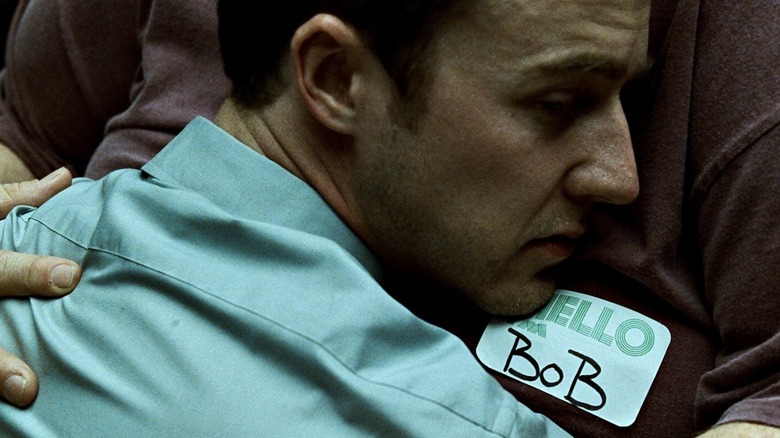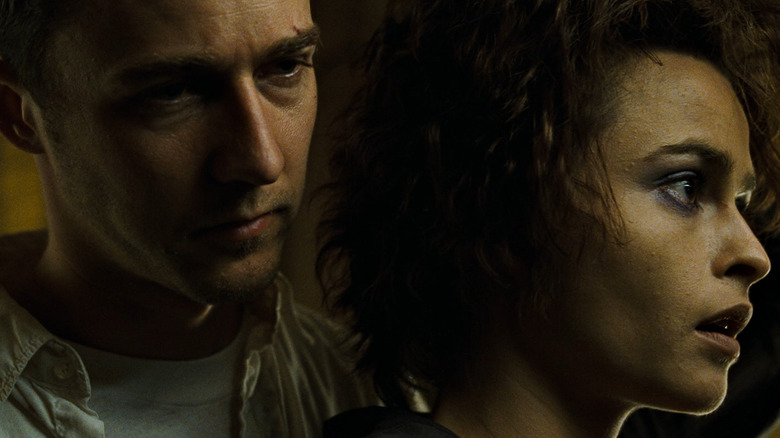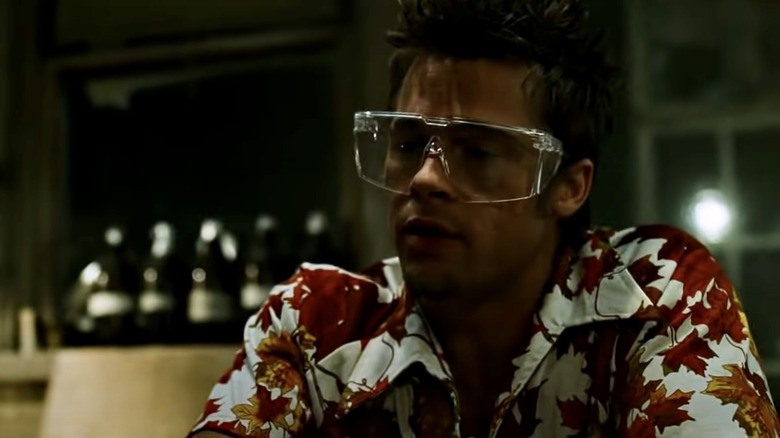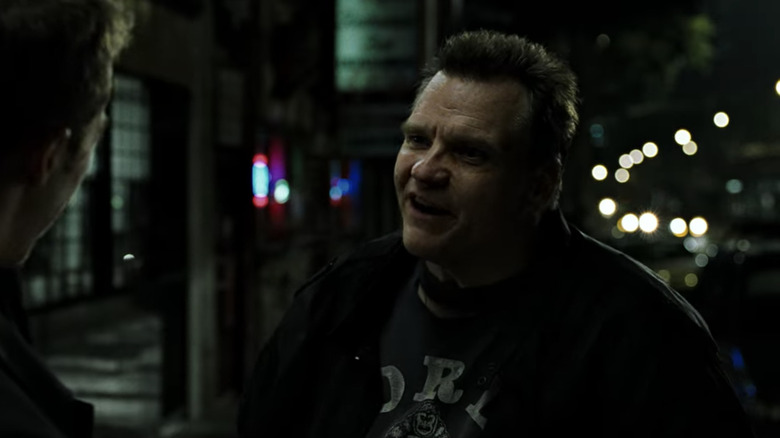The Daily Stream: Fight Club Is More Nuanced Than Its Reputation Suggests, Thanks To Meatloaf And That Ending
(Welcome to The Daily Stream, an ongoing series in which the /Film team shares what they've been watching, why it's worth checking out, and where you can stream it.)
The Movie: "Fight Club"
Where You Can Stream It: DirecTV, IMDb TV (free with ads), TBS/TNT/truTV
The Pitch: An office worker escapes the drudgery of modern life by starting an underground fight club, which soon escalates beyond fisticuffs into a full-blown terrorist group.
A few months ago, we revisited the ending of "Fight Club," which made the news again this week when it came to light that the Chinese edit of the film had significantly altered it. Just days before that, one of the film's stars, Meatloaf, also happened to pass away. Author Chuck Palahniuk responded to reports of the Chinese edit by saying that his book is already "heavily banned throughout the U.S." and that the new ending — whereby the nameless narrator winds up in a mental hospital — actually hews closer to what he wrote.
I've never read Palahniuk's novel. The one book of his that I did read, "Haunted," struck me as a profoundly masochistic work. However, I will admit that I was one of those guys having dorm-room discussions about "Fight Club" and exploring its new-fangled DVD Special Features back in the day. We all wanted to look like Brad Pitt, and maybe that was part of the issue: that "the film itself makes the unglamorous glamorous," as I put it when writing about Pitt's exercise regimen last year.
Some dudes ("The Men Who Still Love Fight Club," as The New Yorker dubbed them) got a little too deeply indoctrinated into the cult of Project Mayhem. They missed the forest for the trees. The flip side of that, now, is self-deputized media gatekeepers on Twitter branding "Fight Club" as a socially unacceptable "red flag movie." Somewhere in-between these two poles lies the text of David Fincher's real film.
Why It's Essential Viewing
"Fight Club" was the moment when Fincher became a zeitgeist filmmaker, capturing turn-of-the-millennium social anxieties for a generation of consumers (and later, Facebook users) like no other director. Before there was "The Social Network," there was this film.
Last year, in the wake of "Mank" and its 10 Oscar nominations — and as various other Fincher-directed movies became available on streaming platforms from month to month — I started slowly but surely working my way back through his full filmography. Yet I procrastinated about "Fight Club" and ending up saving it for last. It was with some trepidation that I sat down recently to watch the film again for the first time in over a decade.
I think part of the reason why "Fight Club" is so often misinterpreted or co-opted for the wrong reasons on both sides of the pop culture divide is that it sends mixed signals even as it tosses a grenade over its shoulder and leaves the room. Fincher gives the movie bromance flourishes with lines like, "Cut the foreplay," "We should do this again some time," and, "Tyler dumped me. I am Jack's broken heart." However, since Pitt's character, Tyler Durden, and the narrator, colloquially known as "Jack" (Edward Norton), are one and the same, these lines are nothing more than the solipsistic imaginings of a man in dialogue with himself.
Tyler is Jack's idealized vision of himself, yet with that comes the true tyranny of a self unfettered. He/they lay out the cardinal rules for their Fight Boys' Club, but pretty soon, they start breaking their own rules, talking all about Fight Club and ignoring it when other guys try to tap out.
They self-actualize as terrorists while feeding their followers through the gristmill like soap made out of human fat. Tyler himself is a spiritual terrorist. Taken in tandem, his actions and speeches imply as much.
Point Without Counterpoint
Tyler talks about being "the middle children of history," saying, "Our Great War is a spiritual war. Our Great Depression is our lives." Yet as he lingers out of focus over Jack's shoulder, he comes out looking like he's on the wrong side of said war. Marla (Helena Bonham Carter) is on the phone with Jack, trying to provide him a lifeline, but she's subject to constant mistreatment and remains in the dark about the full extent of his split personalities.
In absence of any other strong foil, this allows Tyler to peacock and play the Devil without God, point without counterpoint. The chemical burn scene shows him at his most Luciferian, demonstrating the self-inflicted stigmata hand of a false messiah and saying:
"Our fathers were our models for God. If our fathers bailed, what does that tell you about God? [...] You have to consider the possibility that God does not like you. He never wanted you. In all probability, he hates you."
And so we get the line, "In Tyler we trusted," with Durden now supplanting God, deposing him like one of the pigs overthrowing the farmer in George Orwell's "Animal Farm." Elsewhere, Tyler talks about Jack's father "setting up franchises" with different families in different cities, but by the end of the movie, he'll be flying around the country, doing the same thing with Project Mayhem.
He's a hypocrite, sneering at Calvin Klein ads one minute, baring his own washboard abs the next minute. However, most of the time, we're so deeply entrenched in his perspective (keeping in mind that he and Jack are the same person) that it's as if he's no longer just speaking for Jack, but even thinking for him. This is why you get incels (real-life Jacks) and pickup artists (would-be Tylers) repeating back other choice Durden quotes without considering the full context of them. The nuances of the film's "message," if it could be said to have one, were lost on some viewers, as they bought into Tyler's philosophy wholesale and ignored Jack's repudiation of him at the end.
The Overlooked Project Hope
There's another part in "Fight Club" I had completely forgotten about where Tyler laughs maniacally as he allows a mob boss named Lou to beat him up. That part plays very much like the interrogation room scene in "The Dark Knight." Throw in a bleached-blonde Jared Leto, pre-"Suicide Squad," and is it any wonder that people were making so many comparisons between "Fight Club" and the Joaquin Phoenix-led "Joker" back in 2019, when that movie was out and this movie was turning 20?
At one point, Tyler even paraphrases the same idiom that Jack Nicholson's Joker used in "Batman," saying, "You wanna make an omelette, you gotta break some eggs." He instigates car crashes as near-death experiences and just generally does things that a toxic "agent of chaos" would do — only he doesn't have any caped hero there to keep him in check.
Meatloaf's character, Bob, is initially presented as an object of derision, someone who's there to engage in performative grief with Jack at support-group meetings. By the end, however, Bob's death underscores just how dangerous Project Mayhem has become, to the point where it is now causing human casualties. The members of Project Mayhem take up Bob's full name as a religious mantra, intoning, "His name is Robert Paulson," without realizing the nonsense of it or the harm they're doing themselves and others.
There's a scene before Bob dies where they're posing as waiters at a hotel banquet. At the head table, cigar-smoking white men ignore the keynote speaker, a Black community leader who is talking about an initiative called Project Hope. It's a subtle moment, but the juxtaposition of that speaker in the background, with the boys of Project Mayhem leaving to cause more mischief, makes it clear who the good guy is and who the real bad guys are in this scene. Yet I wonder how many young guys watching the movie for the first time would be attuned to a moment like that.
In an attempt to liberate Jack from his Ikea-catalog existence, "Fight Club" takes sympathy for the Devil to its furthest extreme. By the end, Jack reject's Tyler's philosophy and destroys that part of himself. He's holding hands with Marla, and the Pixies are singing, "Where Is My Mind," and maybe it's not such a rhetorical question, after all.



